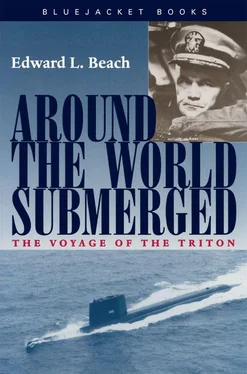“What’s the matter, Jim? Is it Poole?”
“Yes, sir. Worse than ever.”
Thoughts of the impending reconnaissance vanished. “Let’s have it,” I said.
Choosing his words carefully, Jim explained that in his opinion Poole might still be having trouble with the original stone. It might not have passed at all. Temporary remissions of the type Poole had experienced were not unknown in such cases. On the other hand, it was possible that he had been passing a series of kidney stones and that this was the third one. In either case, said Jim, there was no telling how long this would continue, nor to what condition poor Poole might ultimately be reduced. While we had been heretofore running on with the idea that each attack would perhaps be the last, the Doctor felt that he could no longer leave it at that. As we talked, we neared Poole’s bunk.
Poole himself, though obviously in great pain, was not yet completely under the effects of the injection which Jim had been forced to give him. Sensing the reason for my presence, he croaked out a plea that we not turn back. “This is the last time, Captain. I swear it!” he said, but he was in such pain that he could hardly articulate the words.
I could both see and sense everybody staring at me. Their eyes said much, but nobody spoke a word.
A sort of hiatus descended upon the ship. In the conning tower, Dick Harris and his crew were waiting for the word to go ahead, but, having heard of Poole’s new attack, simply stood by quietly.
With Adams and Stark, and Operations Officer Bob Bulmer, I went over the argument again. It was not as though I hadn’t had plenty of opportunity to think it over before this. I had, in fact, already assumed that a decision must be reached one way or the other before we got to Cape Horn.
There never was a question of taking any chances with Poole’s life. Both my orders for the trip and the traditions of the US Navy for peacetime operations categorically forbade it. On the other hand, we should not want to turn back and then have Poole’s condition clear up by itself, as about three-quarters of all kidney stone attacks actually do. Yet we had already gone on for three days. No doubt we could still go on and hope the third attack would be the last. The salient point was that Macon could conceivably help us now, and if we passed her up, the nearest available medical help would be at Pearl Harbor, nearly eight thousand miles away.
Adams calculated how far we would have to travel to meet the Macon, and when. Somehow, it was almost as if there were dead silence in the ship. Not many felt like talking. A person becomes attuned to the mood of a ship, after serving in her a while. Our mood was solemn. Everyone realized what we were up against. Poole obviously had to have help, but to get it for him involved jeopardizing our mission. If, for any reason, the Macon had been diverted from Montevideo, were not within reach, if no other US Navy unit could be sent to assist us—and I knew of none anywhere about—we should have to ask for diplomatic clearance for entry into Montevideo. Once the message was sent, we would be powerless to avert public disclosure of our mission. Unless we could carry Poole for two weeks longer, to Pearl, it had to be either Macon —with whose help we might yet salvage our continuously submerged record—or Montevideo. Success in our cruise meant a lot to all of us; only I had an inkling how much it might mean to our country.
Actually, although I technically made the decision and took the responsibility for it, there really was no decision to be made. Circumstances had made it for us. I picked up the wardroom telephone and dialed “O,” which rings the phone at the elbow of the Officer of the Deck.
I held the receiver to my ear, waited until I heard a voice—it was “Whitey” Rubb.
“Officer of the Deck,” he said.
“Reverse course, Whitey,” I said. “Make your course zero zero nine degrees true and increase speed to Flank. Secure the reconnaissance party. We are heading for Montevideo.”
Recessed into one of the wardroom bulkheads are dials showing the ship’s speed, course, and depth. I watched as the gyro repeater rotated swiftly about until it finally settled at a heading just to the right of north. The speed dial also increased, until it indicated the maximum of which Triton was capable.
And then there was a feeling of frustrated despair for which there was no solution, except to carry on with what we were doing. I took a piece of paper and, with Jim Stark’s help, composed a message stating our problem and asking for aid. It was almost as though I were writing finis to our effort and to the high hopes with which we had started the cruise. Finis, all brought to an end, because of a tiny calcified growth smaller than a grain of sand, which had lodged in the wrong place in a man’s body!
It was very hard not to feel bitter against both fate and Poole.
There was a moment of comfort when I looked up the Macon in the Atlantic Fleet Organization pamphlet. I knew she was flagship of the task force in the South Atlantic, and I was pleased to see that the Admiral on board was listed as E. C. Stephan, my one-time Squadron Commander in Key West years ago. Macon’ s skipper also was a very familiar officer, having been one of our most renowned and successful submarine commanders during World War II. I had never served with him and had last encountered him some years previously in the Pentagon, but everyone in the Navy knew of Reuben T. Whitaker and his dour, enthusiastic efficiency.
Not that friendship, per se, cuts any ice one way or another. But the tie of shared service certainly feels good when you’re looking for help.
The question at this point was simply whether or not Rear Admiral Ed Stephan and Captain Reuben Whitaker would be able to help us.
Drafting a naval message—condensing it to say all that needs to be said with as few words as possible, and then encoding it—takes time. It was a full two hours before we were ready to transmit a final draft. We briefly described the medical facts, and announced that we were proceeding to the vicinity of Montevideo at maximum speed. We would arrive there by one o’clock in the morning of the fifth of March, we said, and, not knowing how else to state it, we put our plea for help in plain English: “Can Macon meet us and transfer Poole?” the message asked.
As we searched the chart for a suitable rendezvous, I was struck by the fact that not far off Montevideo there is a small relatively shallow spot in an otherwise deep ocean area. Probably merchant ships heading to or from the harbor would avoid it—a desirable factor. Should the weather preclude celestial observations, it also gave both Macon and Triton a fixed point of reference for navigation by fathometer. The spot we selected was smack in the center of the shallow area.
Commissaryman Second Class Earl E. Bruch, Jr., sporting a voyage-grown set of handlebars, draws a doubtful twirl from his son after the ship docked at its home station in New London, Connecticut.
Midday is always a bad time to transmit messages, particularly over long distances, for it is well known that much greater range is possible at night. Time, however, was important, for we had no idea what sort of schedule Macon might be trying to keep. As soon as the message was ready, we slowed, came to periscope depth, and transmitted it to, of all places, the U.S. radio station on Guam, some eighty-three hundred miles away straight across the South Pole. Then Triton headed again for the depths and resumed maximum speed.
Our narrative for this period contains the following entries:
Since turning back, except for the time spent transmitting our call for help, Triton has been racing northward, deep beneath the sea, at the maximum speed that her two great propellers can drive her. There is no noticeable motion in the ship, not even vibration. All we note is a slight drumming of the superstructure from her swift passage through the water. Forward she is as steady as a church, as solid, and as quiet. Aft, only the powerful turbine roar gives away the tremendous energy she is putting into the water.
Читать дальше












